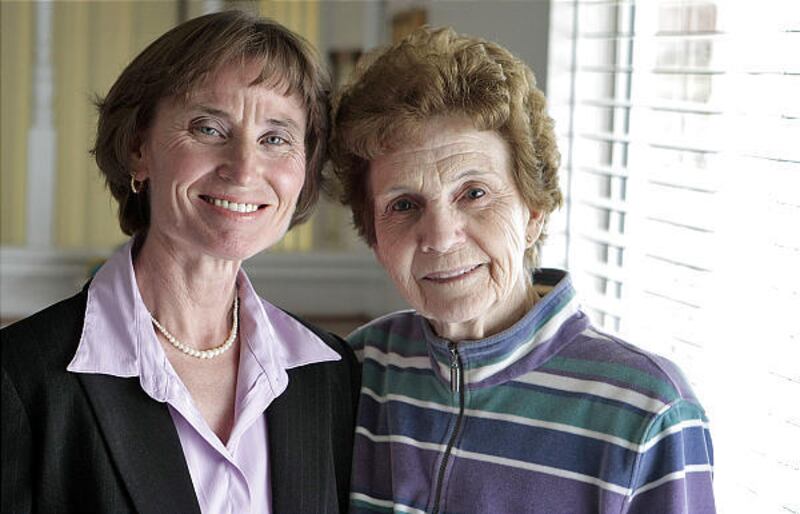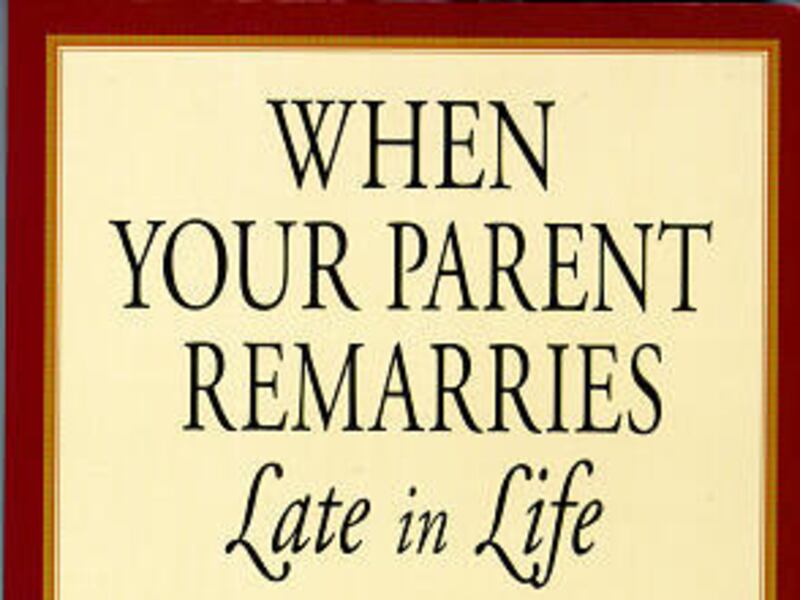Terri Smith was pregnant when her mother died. Her mom was only in her 60s and Smith was not ready to lose her.
Seven months later, Smith's father remarried. But Smith was still grieving for her mom. "I felt lonely and isolated," she recalls.
It took awhile for Smith to stop feeling out of sync with her father and stepmother, the cheery newlyweds. Gradually, her stepmother and stepsiblings came to feel a bit more like family. Eventually, she understood how lonely her father had been in his widowhood.
Her father and stepmother have been happily married for 12 years now. And Smith is happy for them.
Over the years, as Smith talked with friends her age, she learned she was not the only one to have a parent remarry. Others in her Utah County neighborhood were in the same situation.
Smith also came to know older couples in her neighborhood, folks like Ronald and Emma Griggs. He was a widower with no children and she was a widow with five grown children when they married each other, in their 60s. Ronald died a few years ago, but Smith recalls them as delightful together. "Ron loved her children and was thrilled to be a grandpa."
Eventually, Smith did some research and learned that not much had been written about the subject of late-life marriage. She didn't find any advice about how to adapt to a new parent when you are already a parent yourself.
So, she began interviewing her friends, neighbors and friends of neighbors. She interviewed stepmothers and stepfathers and their spouses and adult children. Recently, she published a book on the topic. It's called, "When Your Parent Remarries Late in Life."
James Harper, the head of the School of Family Life at Brigham Young University, wrote the introduction to Smith's book. This week Harper will lead a discussion on parents' remarriage as part of the annual BYU Women's Conference.
In Utah in 2006, the most recent year for which numbers are available, 1,086 men older than 55 were married. That same year, 726 women older than 55 married.
If each bride and groom had two or three children, there would be 4,000 to 5,000 adults in this state who found themselves with a new stepparent in 2006. With luck, their family lives should be settling into a comfortable pattern just about now, Smith says.
She says it takes it usually takes two years for a new stepfamily to establish itself, to start to develop its own rituals and shared history.
Smith says there are five essentials to a peaceful stepfamily. "One is a good attitude. Two, decide who you are and be loyal to that. Be loyal to the values you were raised with.
"Three, take the initiative. We all like to be included and remembered. Those little things are what help build a friendship — calling to say hello or remembering someone's birthday or inviting them to the grandchild's soccer game.
"Four, perseverance. Regardless of what we do, if we want to be successful then we have to persevere. And five, patience. It takes time."
As for Wendy Hodgkinson, she says, "I do love my stepmother. She's a wonderful person. This would be really hard if you didn't like your new stepparent. So, we've been lucky in that way."
And seeing her father's happiness makes her happy, she says.
Yet, when Hodgkinson's father remarried, a few months after her 73-year-old mother died, Hodgkinson and her siblings wept at the wedding. Hodgkinson later apologized to her new stepsisters. She said, "We don't have anything against your mother. It's just that our feelings are so close to the surface today."
Hers is not a weepy kind of family, Hodgkinson says. She was surprised at how difficult this adjustment has been.
Hodgkinson has been invited to speak about parents' remarriage at the upcoming Women's Conference at Brigham Young University. (See box.) She'll talk about ways to include your new stepparent. She'll talk about letting go of your fondness for the way things used to be. She'll say that respecting your stepparent is not disrespectful to your parent's memory.
Hodgkinson won't talk about finances, she says. She's guessing that everyone who comes to the lecture will have already seen a wedding happen. Their parents either made a prenuptial agreement or they didn't, she figures.
She and Smith both have heard the heart-wrenching stories. They've heard about a woman who was her mother's only daughter and had always known she'd inherit her mother's wedding ring — until her father sold it to buy his new young bride a bigger diamond. They've heard about the young and healthy stepmother who never visited her husband after he went into the Alzheimer's care center.
They look past the sad stories. Both Hodgkinson and Smith know the statistics; they know that elderly married folks are healthier and happier than elderly singles. Smith says her father and stepmom have both had back surgeries and needed care, and it's been a blessing for them, and for their children, that they had each other.
Sonia Salari, associate professor in the Department of Family and Consumer Studies at the University of Utah, talks about remarriage when she teaches classes on adult development. She says men benefit the most from remarriage, especially white men. White men don't seem to have as many emotional connections as women do, or as men of other races seem to have.
Men who don't remarry are more prone to depression, Salari says. Women are more connected with their siblings and children. "Plus women know a whole bunch of other widows," Salari points out.
There are so many more women than men in the over-65 group that if a woman wants to remarry she may have to take the initiative, Salari says. She loves to tell her classes about her grandmother's best friend, Katherine, in the Midwest.
Katherine outlived five husbands. When she was single, she combed the obituaries and when she spotted a widower she knew, and she was not above writing him a letter saying she'd like to get together "with the object of matrimony."
Salari offers a suggestion to adult children: If your parent is about to remarry, you might want to urge the couple to sell their homes and buy a new one together. If a stepfather moves into your mother's home, she says, you may not feel displaced. But then if she dies and he marries someone else, you may find it painful to lose the family home in addition to losing your mother.
Smith talks about her family home. She says she found it disconcerting to visit the place she grew up and suddenly feel that she had to knock before entering, that she couldn't get a glass of water without asking.
But another woman lives in that house now. "And it needs to be her home," Smith says. "That's what I had to learn. My dad still lives there, but it needs to be their home."
Now Smith is comfortable with knocking on the door. She is also comfortable working around the house, as she used to do when her mom was alive.
"I can help," Smith says. "I can be useful in many ways."
Smith enjoys being in the kitchen with her stepmom, making dinner for her new and old and ever-growing family.
If you go ...
What: Changing Family Dynamics: Loving our In-laws and Our New Stepparents, a discussion by Wendy Hodgkinson and James M. Harper, head of BYU's School of Family Life
Where: Room 3280-3290, Wilkinson Student Center, Brigham Young University, Provo
When: Friday, 12:30 p.m.
How much: $27 for one day of the Women's Conference, $47 for two days.
Phone: 801-422-7692
Also: The discussion is one of dozens being held Thursday and Friday during the annual Women's Conference at Brigham Young University
E-mail: susan@desnews.com



